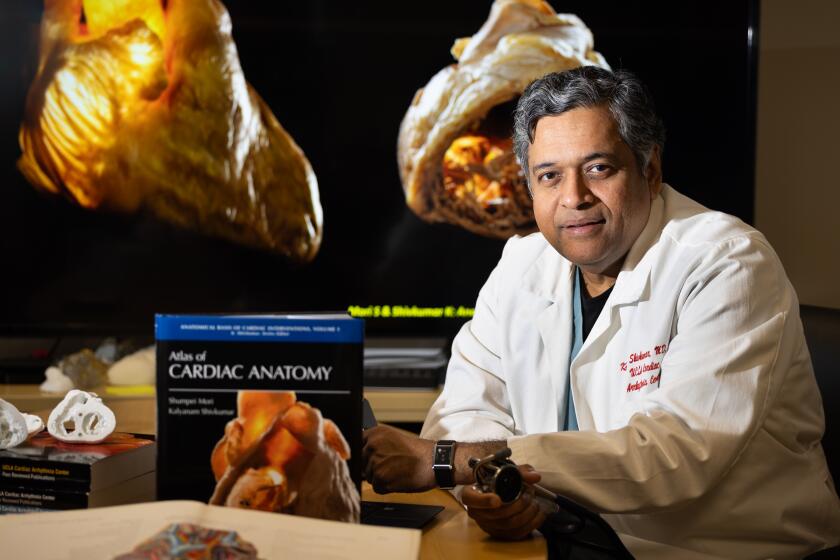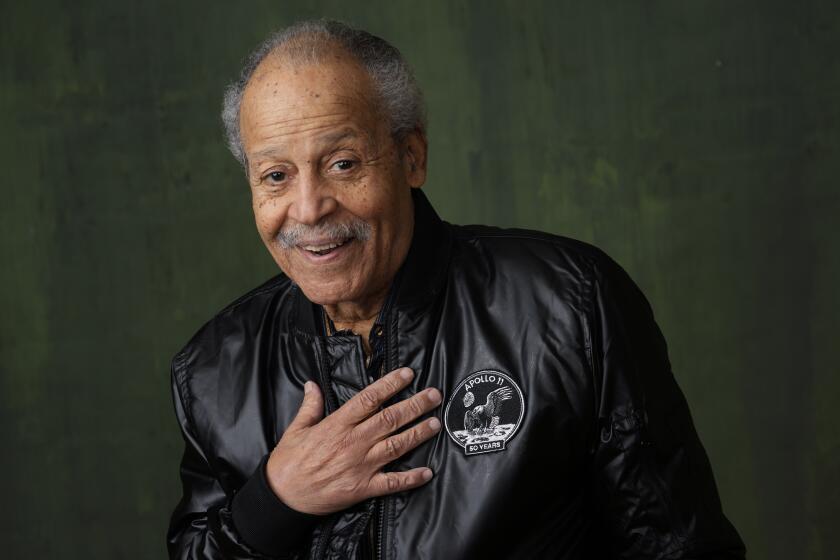Take to Heart
This week, as some Valentines get down on bended knee and pop The Question, we decided to go with a perhaps less romantic but equally life-affecting question of our own:
What’s the best way to take care of your heart?
Here, the experts share their wisdom. (If you notice some repetition, you smokers, eaters of fat and couch potatoes, well, take that as a hint that maybe you ought to change your ways.)
Dr. Jan Breslow, president of the American Heart Assn., senior scientist at Rockefeller University, New York:
“If you take care of your physical heart, you’ll have a lot more metaphysical ‘heart and soul’ to give others. To lower your risk of heart disease, don’t smoke. And that goes for cigars too! Eat a well-balanced, low-fat diet that includes at least five servings of fruits and vegetables a day. Walk or engage in other moderate physical activity for at least 30 minutes most days of the week. Have your blood pressure checked regularly.”
Larry King of CNN’s “Larry King Live,” founder of Larry King Cardiac Foundation, which provides financial grants for surgical and medical treatment of heart disease patients who lack insurance or adequate funds:
“Ten years ago, I had a heart attack [at 53] and six months after that a quintuple bypass and I learned an awful lot from that. You can’t do anything about your genes. My father died at age 43 of [heart disease]. The best thing to do is what everyone knows. No smoking. Exercise. I do the treadmill and an awful lot of walking. I watch what I eat.”
And he follows another simple guideline: “If you are looking at a food and you think it’s wrong, you are right.”
Dr. P.K. Shah, director of cardiology, Cedars-Sinai Medical Center:
“Quit smoking and avoid the company of smokers. Do not be a couch potato. Exercise regularly for at least 40 minutes per day. Do not pig out on fats and red meat--instead, overdose on fresh fruits and vegetables.”
Sharyn Wolf, New York psychotherapist, author of “Guerrilla Dating Tactics” (Plume, 1994) and the forthcoming “How to Stay Lovers for Life: Discover a Marriage Counselor’s Tricks of the Trade” (Dutton):
“Connect your heart with the heart of others. Feeling connected can help you come out on top. It gets you through everything. Whether you are talking about illness or love, you gather strength by feeling connected.
“[The connection] can be to a lover, a child, a puppy, even someone you don’t know. It can be accomplished in 20 seconds. But think about the last time you sat down and looked face to face with someone for 20 seconds. The key is to stop and be in the moment with someone.”
Veronica Polverari, nursing supervisor, cardiac rehabilitation department, Santa Monica UCLA Medical Center:
“When all is said and done, the best advice, whether or not you have had any problems with your heart, is to make or maintain lifestyle changes. That means getting regular exercise, stopping smoking, keeping cholesterol and blood pressure under control, keeping diabetes if you have it under control, and having very good stress management [with meditation or yoga] as well as weight management. For women, it also means talking to the doctor about hormone replacement therapy, which may or may not be indicated.”
Dr. Neil Frazer, director of cardiovascular medical affairs for Glaxo Wellcome Inc. in Research Triangle Park, N.C., the manufacturer of Lanoxin (digoxin), the sixth most commonly dispensed prescription drug in U.S. pharmacies in 1995 and prescribed primarily to treat congestive heart failure:
“Prevention is better than cure. People should exercise, eat healthy and have regular checkups of cholesterol and blood pressure. If heart failure occurs, people should work with their clinician to determine the right course of therapy. There are a number of therapy options available depending on the severity. The key is to determine the best combination.”
Dr. Taro Yokoyama, director of cardiac surgery at Providence St. Joseph Medical Center and CHW St. Vincent Medical Center; nicknamed “The King of Hearts”:
“The bottom line is exercise and diet. Taking medicine to reduce weight is a ridiculous thing. The best thing to do is, don’t eat when you are not hungry. Stick with low-fat foods. If you eat fish, automatically you are reducing fat intake.
“Exercise is absolutely important. In Europe they walk. Americans hop in the car to go to the corner store. That’s no good. . . . We need to walk every day.”
Ed Gillespie, retired postal carrier, Burbank, who underwent bypass surgery by Dr. Yokoyama in late 1994 and is doing well:
“Diet and exercise. No smoking. . . . You have to change your attitude--do not let things get you upset.”



